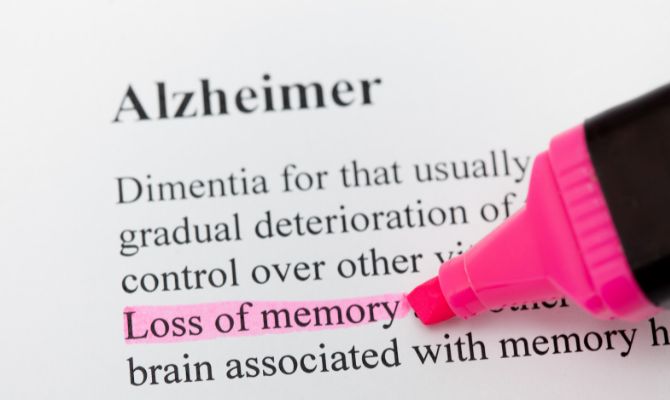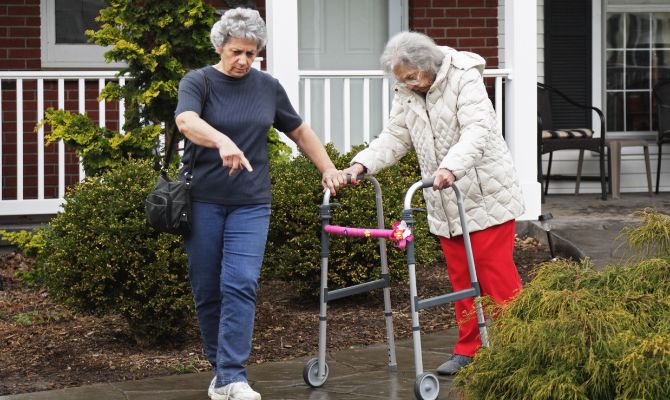If you are caring for a loved one with dementia, you need to implement some basic home safety measures for Alzheimer’s patients.
The list of things that can go wrong in these situations is seemingly endless. Misplaced items can cause falls, medication kept in unlocked drawers can lead to inappropriate dosage, and unsafe staircases can result in serious injuries.
A useful guide for caregivers, this thorough list of safety precautions for dementia patients can help you prevent stressful situations and keep your relatives safe. It features a dementia home safety checklist and useful tips for bathroom, bedroom, living room, and outdoor area safety.
As a caregiver, you must take into account a number of dementia safety considerations and implement various home modifications.
Alzheimer’s patients and people with different types of dementia can often feel threatened by the simplest things. These tips can help you keep them safe while also making them feel safe.
- Why and When Dementia Safety Considerations Matter
- Alzheimer’s Safety Considerations Throughout the Home
- General Safety Considerations for Alzheimer’s Disease
- Forgetting to take medications on time
- Safety Tips For Alzheimer’s Patients Who Wander
- Fidgeting Hands
- Guns and Senior Safety
- Helpful Resources for Alzheimer’s & Dementia
Why and When Dementia Safety Considerations Matter
The brain of an Alzheimer’s patient undergoes periodic modifications that can negatively impact safety. They may forget how to use simple home appliances, lose their sense of time and place, become fearful for no logical reason, lose their balance when walking, or experience vision and hearing loss.
Alzheimer’s safety considerations are important because as patients display more unsafe behaviors, caregivers must change their environment in order to maintain the level of safety following the onset of dementia symptoms.

As soon as you or your loved one’s doctor detect changes in their behavior that are consistent with Alzheimer’s or a similar diagnosis, you should be ready to implement these safety precautions for dementia patients.
The moment to act is now. Delaying implementation of safety measures can cause many problems for Alzheimer’s patients, no matter how recent their diagnosis may be.
Alzheimer’s Safety Considerations Throughout the Home
A conventional home can become a hazardous place for any person with dementia. Unlocked cabinets containing prescription medication, showers without grab bars, lack of monitoring devices, and throw rugs can become a hazard. And as the disease advances, you need to reassess and implement new safety measures periodically. These helpful safety checklists and recommendations can help you turn your home into a safe environment for your loved one.
Bathroom Safety Checklist
A large percentage of accidents involving elderly people take place in the bathroom. This checklist can help you prevent most of them.
- Grab bars in the shower/near the tub
- Shower chair
- Grab bars near the toilet
- Hand-held shower head
- Nonskid mat in the shower/tub
- Nonskid strips near shower, sink, toilet
- Rubber faucet cover in the tub
- Electrical appliances kept in locked cabinets
- Child-safe caps on medication containers
- Keep thermostat below 120 degrees Fahrenheit
- Remove bathroom door lock
Kitchen Safety Hazards for Dementia Patients
Kitchens usually contain sharp knives, fuel sources, potent chemicals, and other potential hazards.
Safety measures you can implement include:
- Safety knobs on stove
- No artificial food-shaped items to prevent accidental ingestion
- Childproof latches wherever chemicals, matches, or knives are kept
- Electrical appliances kept in locked cabinets
Bedroom Safety Considerations for Alzheimer’s Disease
The bedroom can be the safest area of the home, especially if you implement these measures.
- Install a baby monitor to be alerted if the person gets up during the night
- Keeping heating device controls out of reach
- Ensuring the patient goes to the bathroom before bedtime
Living Room Safety Precautions For Dementia Patients
One of the most important living room safety issues has to do with unnecessary clutter. To avoid falls and injuries, follow these basic instructions:
- Clutter free
- No cords in walking areas
- Visible decal on glass doors and furniture
- No open fire in fireplace without supervision from caregivers
Laundry room safety tips
Basic laundry room safety tips to protect dementia patients include:
- Childproof latches wherever detergent is kept
- Prevent access to washer/dryer
- Keep laundry room locked if possible
Garage and basement safety tips
- Childproof latches wherever tools, machines, and hazardous supplies are kept
- Keep vehicles locked
- Remove bikes
Outdoor safety tips
- Add ramps if needed
- Mark step edges with brightly colored tape
- Ensure steps are safe in case of rain or snow
- Restrict swimming pool/hot tub access
- Keep walkways clutter free
- Remove fuel sources from grill

General Safety Considerations for Alzheimer’s Disease
Other safety precautions for Alzheimer’s patients include:
- Keeping emergency numbers and home address by the side of telephones
- Night lights throughout the home
- Nonskid strips on potentially slippery floors
- Light switches at bottom and top of stairs
- Handrails beyond first and last steps of stairs and safety gates if needed
- Smoke detectors and alarms (light and sound) in kitchen and bedrooms
- Spare keys kept outside the home
- Safe door and window locks throughout the home
- Childproof plugs on unused electrical outlets
- Password-protected computers and files
- Monitoring system for patient’s computer and phone use
Forgetting to take medications on time
Dementia patients can seldom take medications consistently. As a caregiver, you must do everything in your power to prevent any medication mistakes. Taking prescription drugs more often than needed or forgetting to take them altogether can lead to overdosing and other negative consequences.
Useful strategies to monitor drug intake and prevent medication mistakes include:
- Clearly identifying medicationս
- Using pill organizers and automatic dispensers
- Checking and tracking doctor’s instructions
- Safely storing medication between doses
- If swallowing pills is a problem, consult pharmacist/doctor about other versions of the medication
Safety Tips For Alzheimer’s Patients Who Wander
Devices you can use and precautions you can implement to prevent Alzheimer’s patients from wandering include:
- Medical bracelets
- Necklace with ID info
- Enrolling the patient in the Alzheimer’s Association 24/7 Wandering Support for a Safe Return program
- Informing neighbors and local law enforcement about the patient’s tendency to wander
- Placing identifying labels on clothes
- Keeping an unwashed garment previously worn by the person to help dogs trace them in case they get lost
- Keeping a recent photo of the patient handy in case police need to search for them
- Keeping house doors locked
- Placing elements that can divert attention from doors, such as colorful streamers or posters
- Installing a system that makes a sound when a door is opened.
- Fencing yards
Fidgeting Hands
Dementia can often cause fidgeting hands. Alzheimer’s and dementia patients sometimes show their anxiety through restless hands. They may pull at clothers, twist fingers, or rub at bedding.
One of the most effective methods to help dementia patients keep their hands safely occupied is using specially designed toys.
Useful dementia toys include:
- Sensory fidget blankets
- Stress ball for squeezing
- A colorful deck of cards patients can shuffle and arrange
Guns and Senior Safety
Firearms can be a problematic presence in the home when Alzheimer patients are around. As dementia progresses, patients may confuse relatives with intruders, which can pose great risks when guns are involved.
The safest way to prevent these risks is to remove the guns from the home altogether. Keeping them in locked cabinets is not enough. As soon as a patient develops any cognitive impairment, guns should be out of the picture.
Dementia affects each person in a unique way. Your loved one’s needs are going to change as the disease progresses. For this reason, you should assess home safety and address any potential risks periodically to guarantee their safety and comfort.

